“The beauty of our fight for gender equality is that every human being will gain from it.”
— Melinda French Gates, Bill & Melinda Gates Foundation
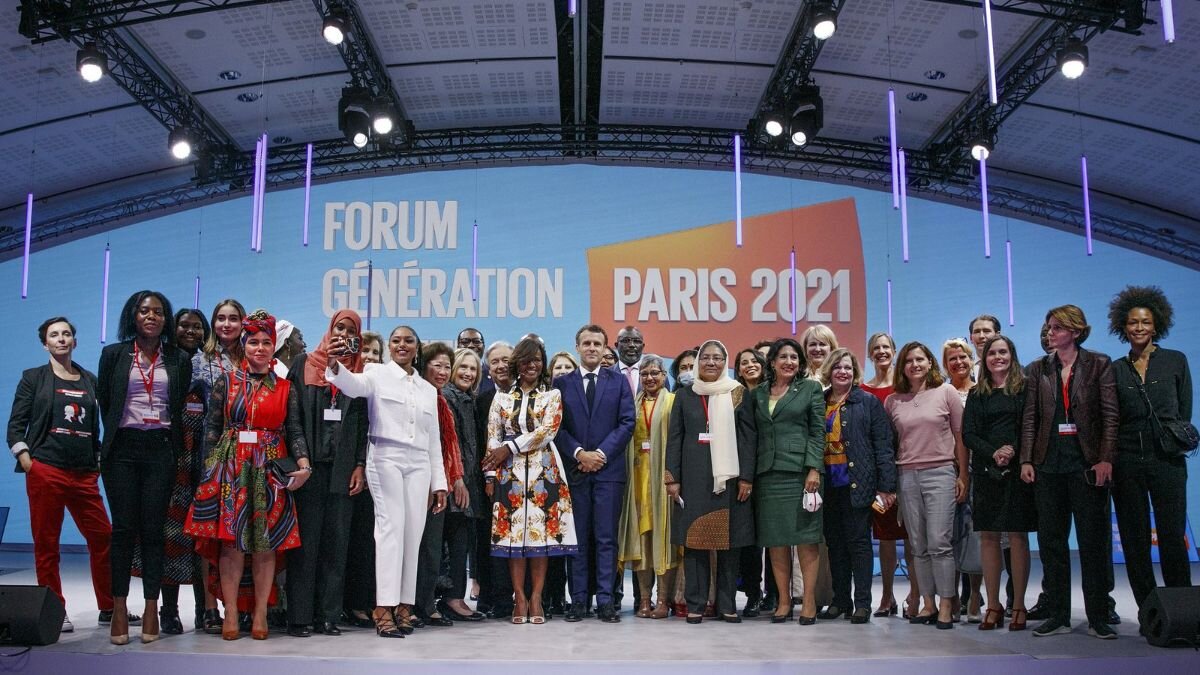
The Generation Equality Forum—held in Paris from June 30–July 2, 2021 and livestreamed to participants around the world—was a monumental event that set a new and unprecedented level of funding to prioritize and implement gender equality programs and commitments.
The total amount of new funding is $40 billion over five years—”the largest amount of investment to advance gender equality and women’s rights ever”—with two billion coming from the public sector, four billion from philanthropy, and $13 billion from the private sector.
A quarter century after the U.N. Women’s Conference, at which 189 countries pledged to adopt the ambitious Beijing “Platform for Action” to achieve gender equity, once again political leaders, feminist movement leaders, corporate executives and activists gathered to address the disproportionate impact the pandemic has had on women and girls, and to commit to action that will accelerate global progress over the next five years, by 2026.
Former Secretary of State Hillary Clinton, who memorably declared in Beijing that “human rights are women’s rights, and women’s rights are human rights,” spoke in Paris, and she reflected on the past 25 years, saying, “Now looking back, I believe we have made progress not near enough, and that we have to recommit ourselves to going even further. But we also need the power to claim the rights. Rights without power [add] up to very little.”
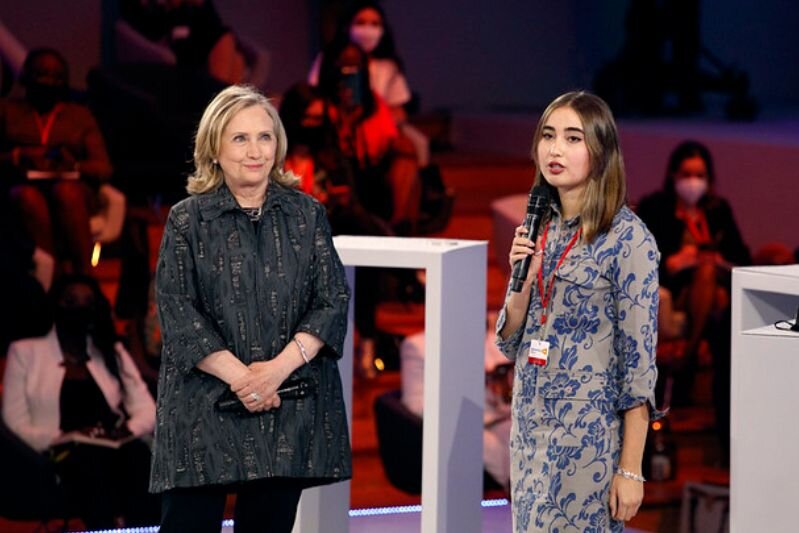
World leaders from Sweden, Finland, Argentina, Kenya, South Africa and Tunisia joined French president, Emmanuel Macron, and Mexican president, Andrés Manuel López Obrador, in Paris, while other leaders, including U.S. Vice President Kamala Harris, delivered remarks virtually.
Nearly 50,000 activists, politicians, philanthropists and business leaders registered for the conference, and many participated online during three days of presentations, film screenings and action coalition announcements.
Organizers focused on catalyzing action in six thematic areas: gender-based violence, economic justice, sexual and reproductive health rights, climate justice, technology and innovation, and feminist movements and leadership. “The funding will go toward instituting hundreds of new gender-focused policy proposals” related to these issue areas, according to The New York Times. The convening launched a Global Acceleration Plan for Gender Equality to be carried out over the next five years.
“The world has been fighting for gender equality for decades, but progress has been slow. Now is the chance to reignite a movement and deliver real change,” Melinda French Gates told The Guardian. At GEF, the Gates Foundation announced “a new commitment of $2.1 billion over five years to economic empowerment, health and family planning, and accelerating women in leadership.”
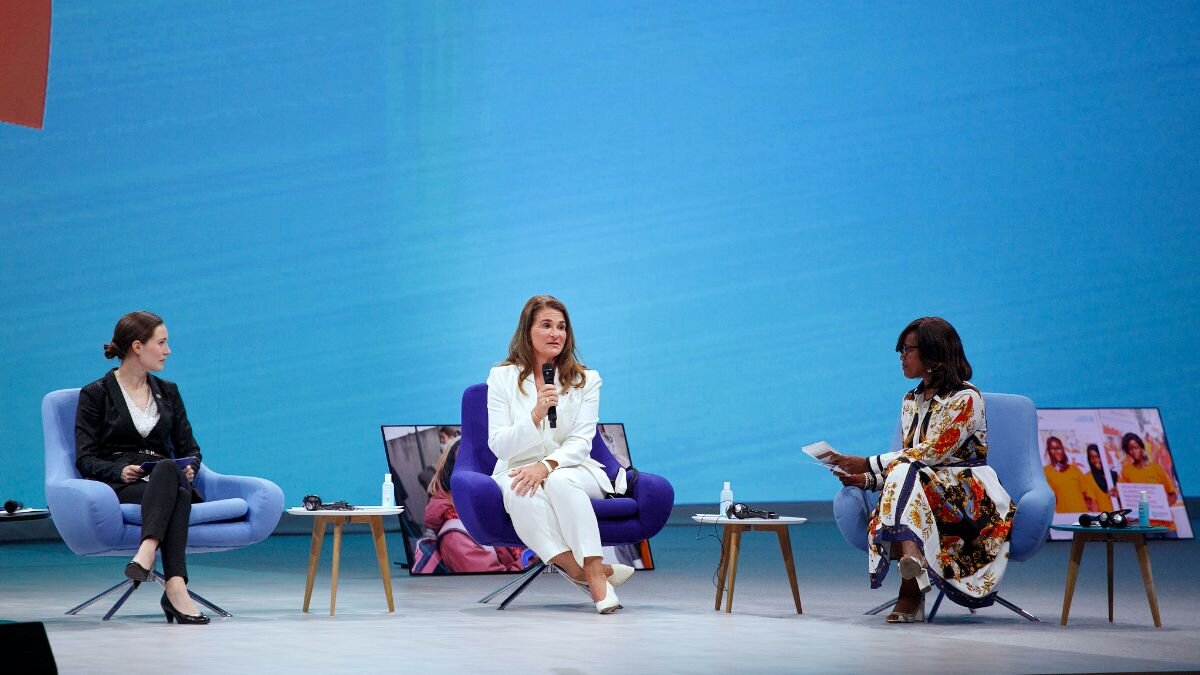
Other notable funding commitments from organizations and corporations include:
- The Children’s Investment Fund Foundation, the world’s largest foundation focused on children: $500 million focused on climate change
- The Ford Foundation: $420 million, with $159 million devoted to addressing gender-based violence
- The World Bank committing to funding programs in 12 African states to tackle gender inequalities
- P&G committing to advance women’s economic justice and rights through its global value chain by spending $10 billion with women-owned and women-led businesses through 2025
- Women Moving Millions: $100 million
- Open Society Foundations: at least $100 million to fund feminist political mobilization and leadership
- PayPal: $100 million to advance women’s economic empowerment
- The Malala Fund: at least $20 million in new feminist funding to girls education activists.
(Read More: 14 biggest pledges from the Generation Equality Forum in Paris; Billions pledged to tackle gender inequality at U.N. forum)
“As some parts of the world start to emerge from the pandemic, it is essential that gender equality is at the heart of building back better. It’s time to stop talking and start funding the organizations that are driving change and the necessary progress on global gender equality.”
— Nicolette Naylor, program director of the Ford Foundation
In addition to these bold investments, heads of state, NGOs, activists, philanthropists and corporations made more than 1,000 commitments to action. Forum organizers expect that the approximately 1,000 commitment-makers, including 440 civil society organizations and 94 youth-led organizations, will be joined by many others over the next five years.
All commitment-makers, from grassroots activist organizations to U.N. member states, were required to submit their commitments ahead of the conference and were encouraged to “submit clear, measurable proposals that fell under any of the six main policy areas,” according to The New York Times.
“Some government representatives tried to sneak in half-baked commitments, such as laws that had already been passed or items with no budget attached,” [French Ambassador and Secretary-General of the Forum, Delphine O] said. “In those cases, U.N. Women went back to those participants and asked them to step up their game.”
The U.S. committed to a range of significant policies and investment requests, including an investment of one billion dollars to support programs to end violence against women, and $175 million to prevent and respond to gender-based violence globally. The White House also pledged to prioritize the reauthorization and strengthening of the Violence Against Women Act (VAWA), which passed the House of Representatives this spring with bipartisan support and is pending in the Senate.
“This is the strongest that the U.S. has come in, in many years,” Sarah Hendriks, director of the policy and intergovernmental division at U.N. Women told The New York Times.
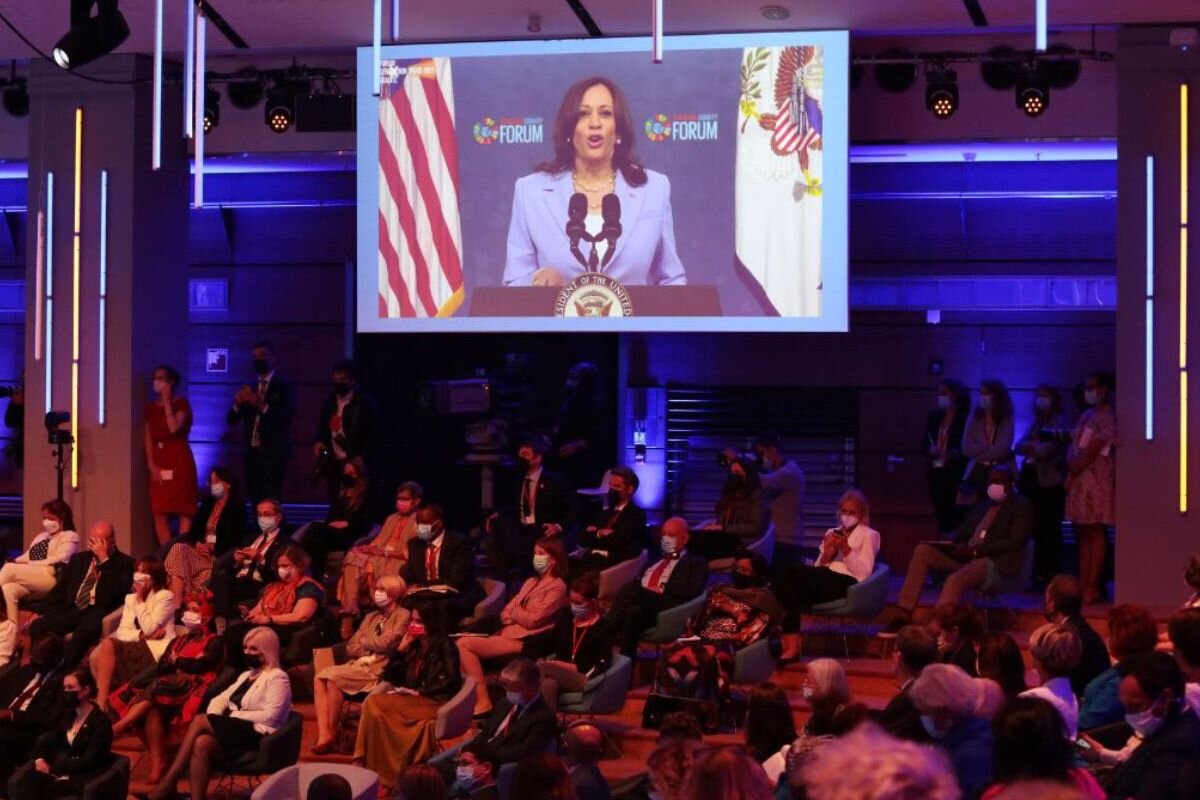
In addition, the forum also launched a Compact on Women, Peace and Security and Humanitarian Action, and announced new gender equality initiatives focused on health, sports, culture and education. The compact calls for the “redesign of peace and security and humanitarian processes to systematically and meaningfully include women and girls—including peacebuilders, refugees, other forcibly displaced and stateless women and girls—in the decisions that impact their lives.”
Connected Women Leaders (CWL), a Rockefeller-funded initiative that I co-lead, with partners Ronda Carnegie and Hafsat Abiloa, committed to mobilize and amplify women leaders around the world. CWL’S mission is to activate women leaders, working together, sharing experiences and diverse perspectives, to shape innovative solutions to global challenges and mobilize their networks, communities, and constituencies for action and implementation. (Learn more.)
Another commitment addressed new threats to safety that women didn’t face 25 years ago in Beijing. The CEOs of Facebook, Google, TikTok and Twitter pledged to work to end the abuse of women on their platforms, and to support gender equality and the empowerment of women in tech. The same day that commitment was announced, prominent women around the world signed an open letter acknowledging the pledge as a positive first step and encouraging deeper commitments to truly make the internet inclusive and safe for everyone.
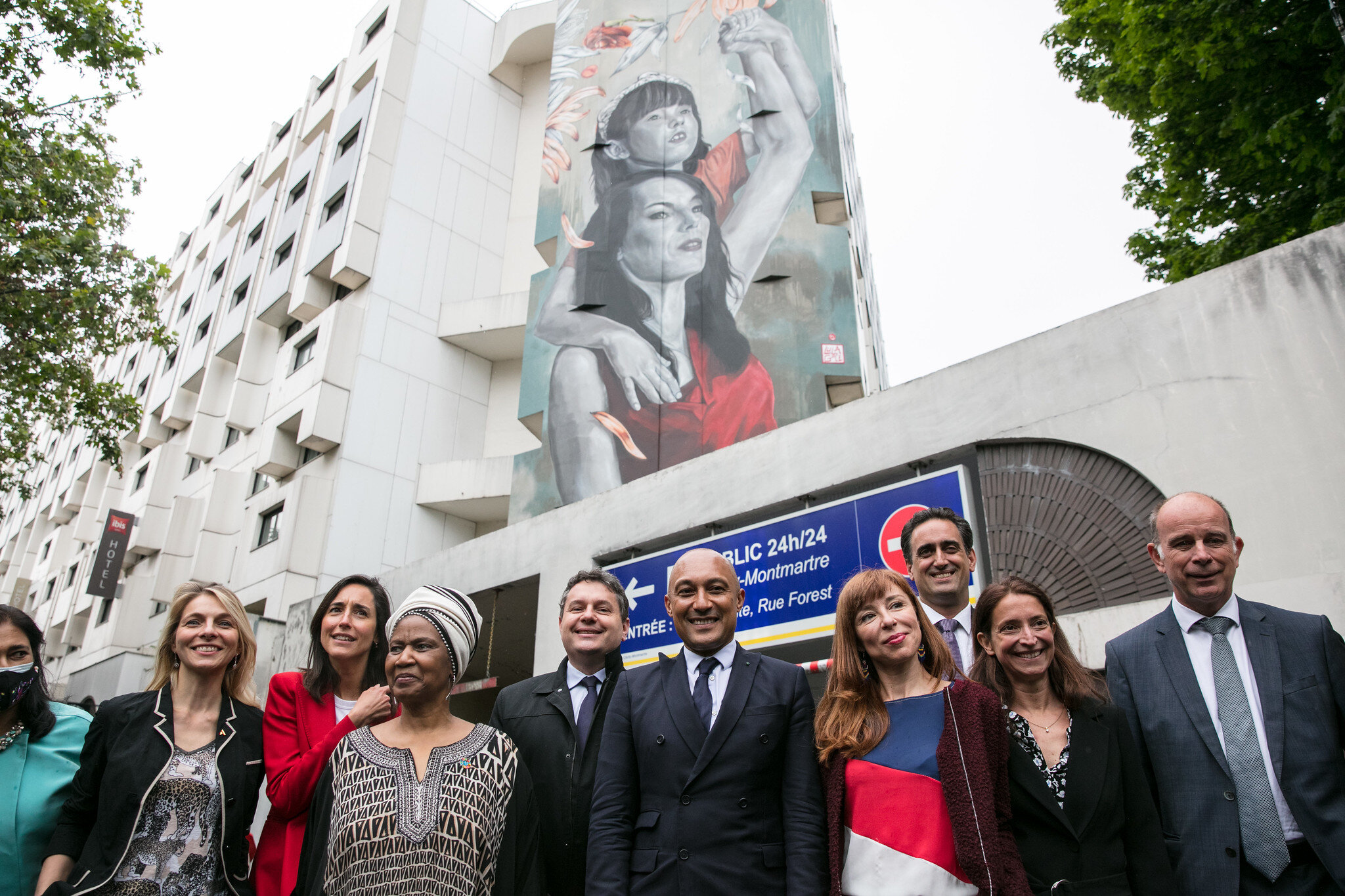
The open letter was signed by more than 200 women, including Michelle Bachelet, the first female president of Chile; former prime minister of Australia Julia Gillard, U.K. member of Parliament Diane Abbott; Rage Becomes Her author Soraya Chemaly; and actress Ashley Judd, who gave a TEDWoman talk in 2016, “How online abuse of women has spiraled out of control,” speaking about her personal experience with digital abuse calling on legislators and the tech community to take a stand against online harassment. I also signed and will be inviting others to join us. (Add your name here.)
“As you work toward these goals, we’ll be watching: We will recognize when you make progress and hold you to account when you don’t,” the letter said. “If you build this better internet for women, you will build a better internet for everyone. You have the way. Now show the world that you also have the will.”
All in all, the Generation Equality Forum was an inspiring, purposeful, and hopeful event. But now the real work begins.
U.N. Women will maintain a critical role driving the forum’s five-year action journey, overseeing the implementation of commitments to ensure accountability and progress over the next five years.
“Together we have mobilized across different sectors of society, from south to north, to become a formidable force, ready to open a new chapter in gender equality,” said United Nations under-secretary-general and executive director of U.N. Women, Phumzile Mlambo-Ngcuka.
Onward!
This article originally appeared in the Pat Mitchell Media Blog.
Up next:





